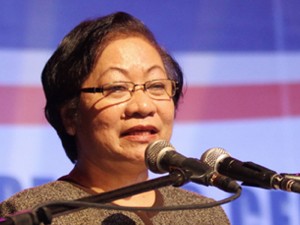Philippines on right track but problems remain, says int’l labor official

Labor Secretary Rosalinda Baldoz was scheduled to lead the Philippine delegation to the ILO’s 15th Asia and the Pacific Regional Meeting, which will be attended by around 30 other labor and employment ministers. INQUIRER FILE PHOTO/NIÑO JESUS ORBETA
KYOTO, Japan—The Philippines is on the right track by focusing on “inclusive growth” but many problems remain, a ranking International Labor Organization official said yesterday as the ILO opened a major regional meeting here on how to protect jobs and economic growth amid the global financial crisis.
Jeff Johnson, ILO country director for the Philippines, commended the Aquino administration for focusing on “inclusive growth” and developing the agriculture sector, adding that the country had a lot to share with its neighbors during the ILO’s 15th Asia and the Pacific Regional Meeting (APRM), which will go on until Wednesday.
“I think it is very important for the Philippines to highlight especially what the administration has been bringing on—inclusive growth. This ties very much with what we’ve been speaking about in the ILO from the inception of the crisis —that we’re facing a paradigm shift,” said Johnson in an interview.
“We’ve been talking about this shift for a long time… that we need to focus not so much on the level of economic growth within the country (but), more importantly, how that growth is achieved,” he said.
“I think the Philippines has a lot to add to the region to help others understand its growth path and its paradigm shift that I see taking place here,” he added.
Very impressed
Johnson said he was “very impressed” with the Aquino administration’s approaches to tackling poverty, particularly its cash transfer program for the poor.
“I think the Philippines has a very unique knowledge base. Again, people still look to the Philippines in terms of migration issues, in terms of seafarers, in terms of how to address issues, including young people or special groups into the discussion,” he said.
“Again, the Philippines has very unique advantages from the regional perspective that will allow it to contribute (to discussions at the meeting),” he said.
Labor Secretary Rosalinda Baldoz was scheduled to lead the Philippine delegation to the conference, which will be attended by around 30 other labor and employment ministers.
Economic uncertainty
Japanese Prime Minister Yoshihiko Noda gave the keynote address yesterday afternoon when the meeting opened at the Kyoto International Convention Center.
The conference comes at a time of “extreme economic uncertainty and amid growing concern that, while the region’s economic performance remains positive, it will not be immune to the turbulence affecting its key export markets,” the ILO said.
“The existing unbalanced growth cannot continue. It has failed to deliver jobs of the quality and quantity needed to assure women and men and their families a decent life,” said ILO director general Juan Somavia.
“Today, unemployment levels in Asia and the Pacific have yet to reach the precrisis low of 76.9 million in 2007. Nearly 60 percent of the region’s workers are in vulnerable employment. We need a model of growth that is more socially and economically efficient,” he said.
Somavia said the “crisis of youth employment” needed “urgent action” with young people making up around 20 percent of the region’s population “but are half of the jobless.”
“The Philippines, being still a relatively young democracy, you have a voice and what (the Philippine delegation) can share is their experiences, both positive and negative. You still have such a wealth of knowledge and experience,” Johnson said.
Agriculture development
He also singled out the Aquino administration’s focus on developing agriculture and public-private partnerships as an engine for economic growth.
“In the Philippines’ plans, agriculture is playing a very important role and it’s not just about growing something but also how you add value to that processing. There is much focus on improving productivity and efficiency in agriculture,” Johnson said.
“You have companies in Mindanao like Dole Fruits—that has basically helped the Philippines become the number one producer of pineapples—and canneries and packaging, etc., that create more jobs and again that’s all agriculture-based,” he said.
Vulnerable employment
“If you look at the administration, they’ve played up on that very well. I think this administration has a number of things that they’re moving forward with that are very supportive of economic and inclusive growth,” he added.
Johnson also said, however, that many problems remained in the labor sector, like the high rate of vulnerable employment in the country.
“Vulnerable employment in the Philippines stands at 40.2 percent and it’s going down very slowly. Those workers are own-account workers or unpaid family workers, small-scale farmers, peasant farmers, petty traders or those who work in food stalls,” Johnson said.
“Those workers lack social protection, no social security mechanism in place, and they probably have no PhilHealth. They have very little protection for their occupational safety and in health regulations, and clearly no collective bargaining,” he said.
According to the ILO’s Asia-Pacific Labor Market Update that was released last week, “some progress” in employment creation in the Philippines “was unable to prevent” a higher unemployment of 7.1 percent.”
“The economy struggled to generate sufficient jobs to match its expanding labor force of nearly one million new labor market entrants in the last year,” the ILO report said.